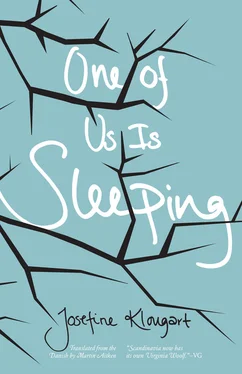She lifts a box down onto the floor, though can hardly find room for it. There is nothing written on it, no indication of what it might contain. She pulls apart the flaps of the lid, and on top are two socks belonging to different pairs. Then piles of American magazines. Some food magazines, and kitchenware. The cast-iron pan they got from her parents for Christmas one time. She runs a finger over its surface and finds it still to be greasy. A drop of moisture descends from the pipe above her head and atomizes against it, myriad beads dissipating across the surface in perplexing patterns. She looks up to see another droplet forming. She thinks of how she oiled the pan with rapeseed oil, only days before they went away. She remembers it always being left out on the stove. Or was that the older one, also from her parents, she wonders, suddenly in doubt. She can’t remember. First there was one, then the other. This is going to take months, she thinks to herself.
Later in the evening the light is warmer, an hour comes during which the space is aglow with descending sun, only then to darken almost at once. She is sorting some bowls, thinking about which ones she actually wants. She sighs and sits down against the wall, drinks from her bottle of water. She picks out some cutlery and throws the bluntest knives into a dilapidated box that has quenched its age-long thirst in condensation and become a box for things discarded. The things she knows he doesn’t want. In spite of everything. She finds a tablecloth, rolls the good knives up inside it and puts them in her bag. The granite mortar and pestle, too. Some jars of honey, though their contents are mottled with white crystals. Is it yours or mine, that mortar and pestle, she wonders, without knowing for sure. There is a whole case of tumblers, three-sided, flat. Liquor. A small metal sieve for the shaker when pouring, to filter away the flesh of lemon, the seeds, and ice, from the cocktail. Her phone lights up again, and she texts back to cancel a meeting with a friend. She cancels the thought of her dead man even being capable of being here in the basement with her. She thinks there would always be some excuse. Some reason for unfortunately not being able, no matter he much he really would have liked — and it might be Italy or Copenhagen, work or something else, something getting in the way. You know how it is. She doesn’t think it could ever be any different than that. Something like doing something on your own. Like when she used to go for morning walks with him in the woods, the times he tried. He, who had always been, so she thinks now; you, who always will be:
disappointed by the woods.
Everything shifts, the world I describe vanishes word by word, that mother of mine. Everything that has to be sacrificed for something that can never compete with what came first and is most genuine. A lonely place in which to stand, exposed as the trees they allow to remain here and there when harvesting timber, not having the heart in the final analysis to leave the landscape entirely bare. And maybe you come home after a long time away, with a feeling of having been lost — a feeling of why did I go, what was I doing.
The landscape you make your home in childhood is a landscape that forever resides in your face. You carry it with you the rest of the way. And the consternation that awaits: the appalling dismay of returning home. Standing there with a face that doesn’t fit; a face fallen, like the trees toppled by wind.
There not even being a home here anymore.
What kind of a face is it that has become, — well, what, exactly. Foreign to the world, planets floating in space, wrong planets, confused, bewildered faces in peculiar orbits around something such as home, something such as an instance of love.
NATURAL DISASTERS DON’T distinguish between what is foreign and what is not. Nothing stays as you left it. The return home is impossible, one must reconcile oneself with a face that is foreign.
The landscape doesn’t miss you. The hills have not pined. To the hills, one person is no more or less foreign than another. All people are always both parts: there is always some recognition, something shared; and no one willing to be shunned in that way. Marginalized like foreign bodies, infants mixed up at birth, planets likewise confused. And maybe unreality is like that, too, indifferent as to how much history and how recognizable.
THE THIN MAN’S cigarette divides the darkness in two. He walks along the pavement in the other direction.
The roads go on ahead, they will be home before us, I think to myself.
I have lived nowhere in particular for nearly three years, you confide to the tree, proudly. As though you have wandered without water, now to reap here upon the summit.
There was really nothing I wanted more, you say, halting with your arms slightly extended at your sides. A bit like the crane, its wings out to dry.
Than what, you ask, nothing you wanted more than what; than to show you, I say, to show you how someone lives.
THE DOORBELL RINGS, and she presses the button to open the door without lifting the entryphone to hear who it is; she knows it’s him. She adjusts a few small things, places some open books in a pile, lights a candle. Hi, he says. His face is torn open, and expels the image of a person dejected. He asks about her books, how things are going in that respect, and she tells him they’re not. Then you must be living a lot, he ventures optimistically.
You could say the opposite.
As if literature had anything to do with any apportionment; anything to do with that kind of fairness. As if fairness even had anything to do with apportionment, balance. She lifts her legs and places her cold feet in his lap. He talks as he rubs warmth into her toes. I’ve found a new apartment, he says all of a sudden, I’m going to be living on my own. She doesn’t entirely believe him, that it could even be possible. He is a ring that passes from one girl’s hand to another, is glassy-eyed from encounters of skin. Good, she says. Does it mean you’ve split up, you living on your own.
I’m not even sure we’re together, if you could call it that. She nods.
It’s mostly just living together, he says.
She nods again. I’m not sure I understand, she says.
No, he says, I’m not either. The winter is an anesthetic.
But then it’s not just the winter.
HE SAYS HE doesn’t understand why she doesn’t go away for a while. You can write wherever. She turns to the window, tries to push it open, only it sticks.
What’s stopping you, he asks. You can make a new home somewhere else.
He doesn’t believe it himself. He gives her a hand, a sharp shove against the bottom rail. She imagines his hand going through the pane, a shower of glass descending like a veil, the world outside at once becoming clear, commanding the mind, the way some lithographs do, razor-sharp and in a way more real than anything ever seen. It opens, and the warm air of inside collides with the cold of the courtyard.
Or you could come back.
It’s as if he forgets, between each time they speak, that other people exist. That she has someone else, or more precisely, hasn’t. That she is tied and bound. That he is.
She looks at him and smiles:
Great, she says, that would be fine.
BABY CARRIAGES IN the courtyard. Windows thrown open, duvets spewed out like foam to dry; the clatter of bicycle locks, back doors that slam, a scattering of green buds, the way nature exists inside the city; an absence of all else but thoughts revolving around not revolving around death and winter and men who are no longer here. The impossibility of taking leave of something that never was. Something else that cannot be taken leave of, precisely because it was. Tangibly, when the past is pressed into everything, and when your thoughts are. The fact that there is a storage room in the basement and things there that they have accumulated. An indivisible remainder, everything fractioned, stumps of teeth inside a mouth; she is broken by all their things; she is again broken by the mere thought of what she can remember and what she has already forgotten. That, on its own. When there is no one to witness, a glove in the snow, left behind and forgotten all winter, now suddenly come to light, bulging with something inside, reminiscent of a hand, the humanity of it, dulled suede against the black soil, and then ten days on: snowdrops like stars all around, a sky in the borders, in a corner of the garden.
Читать дальше












